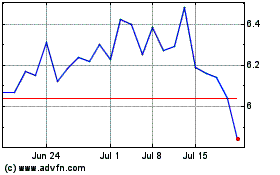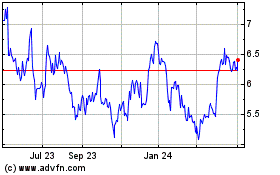Norsk Hydro Identifies Virus That Hit Systems -- WSJ
April 11 2019 - 3:02AM
Dow Jones News
By Catherine Stupp
This article is being republished as part of our daily
reproduction of WSJ.com articles that also appeared in the U.S.
print edition of The Wall Street Journal (April 11, 2019).
Norwegian aluminum and energy company Norsk Hydro ASA confirmed
that hackers used a relatively new form of ransomware known as
LockerGoga in a March 19 cyberattack that crippled the company's
global operations.
Norsk Hydro's cybersecurity analysts found six strains of the
LockerGoga virus in their systems, said Jo De Vliegher, chief
information officer, in an interview. It is the first time Norsk
Hydro named LockerGoga as the virus that infected its facilities
and forced several of its business units to switch to some manual
operations. Norway's National Security Authority also has been
investigating the attack and said previously it identified
LockerGoga.
"It really hits everybody like a tsunami. It's not an IT crisis.
It's the complete business that is temporarily paralyzed," Mr. De
Vliegher said. "Everybody needs to find plan B's and solutions to
just keep the boat floating."
Most of the company's production is back to normal but some
administrative tasks are delayed, the company said. Mr. De Vliegher
said he could keep a crisis team working on the investigation into
the summer and perhaps until year's end as the probe continues. The
attack has so far cost the company 300 million to 350 million
Norwegian Krone ($35 million to $40 million), it said last month.
Norsk Hydro hasn't paid a ransom, the company's chief financial
officer said last month.
It is particularly difficult to investigate the attack because
the virus made surprising moves, researchers said. For example, it
logged users out of company systems and made it impossible for them
to log back on.
"If you can't log in to see the ransom message, it doesn't
really look like ransomware. It looked more like destructive wiper
malware," said Earl Carter, a threat researcher at Talos, Cisco
Systems Inc.'s cybersecurity group.
For recovery work, Mr. De Vliegher rearranged staff and deployed
new security tools. His team is also building tools internally,
with some funds redirected from other projects. Remediation is
taking a toll on employees, who now rotate tasks with overworked
colleagues, he said.
Three weeks in, Mr. De Vliegher's team doesn't have all the
answers it seeks.
Investigators don't know how attackers accessed the system but
do know that the attackers disguised themselves as legitimate users
on the network, he said.
"LockerGoga, the virus in itself, is not rocket science," he
said. "The sophistication of the attack is more in what they have
done in order to get to the point where they can deploy the
virus."
Hackers using LockerGoga need some knowledge of a target
company's systems to infect computers manually because the virus
can't be deployed remotely, said Rik Ferguson, vice president of
security research at Trend Micro Inc., which isn't involved in
Norsk's recovery effort.
LockerGoga hit three other industrial companies recently,
cybersecurity researchers said. French engineering firm Altran
Technologies SA was attacked in January and U.S. chemical companies
Hexion Inc. and Momentive Performance Materials Inc. in March.
Representatives for Hexion and Altran didn't respond to questions
about LockerGoga. A Momentive spokeswoman declined to comment.
Mr. De Vliegher reorganized parts of his security team into
groups focused on forensics and security issues related to networks
and Microsoft Corp. products.
The team is deploying new security tools such as endpoint
monitoring systems and a new policy for how applications access
company networks. Mr. De Vliegher declined to provide details about
the specific technology changes.
Some of these changes were easier to make than they might have
been on a typical day, he said. The work would have required
disabling operations for one week or longer, he said.
"We've been using this crisis to rebuild the setup as world
class," he said.
When he learned of the cyberattack, Mr. De Vliegher cut short a
trip to Brazil to return to Norway. The company's chief executive
officer's first questions were about the magnitude of the attack
and which business units were hit, Mr. De Vliegher said.
The company's ability to switch its operations into manual mode
highlighted the importance of having the ability to override
automated systems, he said, "because technology will fail."
"The biggest worry is not week one or week two. It's really when
one month has passed and your most critical people are totally
exhausted and recovery has still quite a way to go," he said.
Write to Catherine Stupp at Catherine.Stupp@wsj.com
(END) Dow Jones Newswires
April 11, 2019 02:47 ET (06:47 GMT)
Copyright (c) 2019 Dow Jones & Company, Inc.
Norsk Hydro ASA (QX) (USOTC:NHYDY)
Historical Stock Chart
From Dec 2024 to Jan 2025

Norsk Hydro ASA (QX) (USOTC:NHYDY)
Historical Stock Chart
From Jan 2024 to Jan 2025
